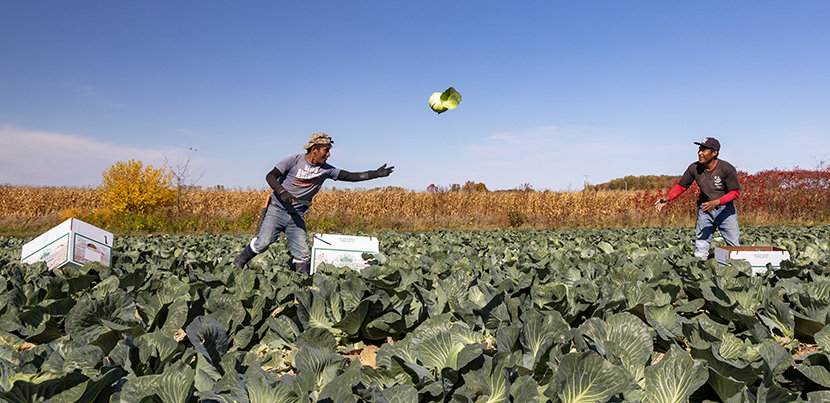Don’t Compromise on Farmworker Rights

The Farm Workforce Modernization Act promises to legalize undocumented farmworkers—but it comes with onerous restrictions to that process and mandatory immigration background checks for all farmworkers. Photo: Jim West / jimwestphoto.com
I covered the immigrant “mega marches” as a freelance reporter in 2006. In response to some horrific, punitive legislation passed by the House of Representatives, millions of immigrants took to the streets of Los Angeles, Chicago, Dallas, and other cities.
But unions didn’t take advantage of that energy in the streets to build a movement. Instead, union officials reacted—some for, some against—to policies coming from DC.
Advocates at nonprofits and policymakers in both parties who claimed to be pro-immigrant pushed forward their pre-existing proposal—an attempted compromise among pro-immigrant, pro-business, and xenophobic forces in Congress—and led everyone at the grassroots to get in line.
The movement died. Then the flawed compromise legislation did too.
No doubt there was cynicism and self-interest behind that legislation. But some of those pushing it just couldn’t imagine anything better, despite the evidence staring them in the face: millions of people in the streets.
Occasionally there comes a moment when it’s suddenly clear that circumstances have changed. A new sense of possibility opens up. In those moments, we must adapt to the new reality, hold firm, and demand more.
For farmworkers, that day is today. There may not be millions in the streets—but with the rejection of Trump, there is an opening today, however slight, and we should seize it.
A TERRIBLE BILL
Unfortunately, that’s not what is happening. The Farm Workforce Modernization Act (FWMA), passed in the House in March, is a terrible bill. Agribusiness helped put it together.
The bill would enlarge the H-2A “guestworker” program that brings in foreign workers tied to a single employer and vulnerable to his abuses.

SUPPORT LABOR NOTES
BECOME A MONTHLY DONOR
Give $10 a month or more and get our "Fight the Boss, Build the Union" T-shirt.
Wages for H-2A workers would be frozen until the end of 2022 and then raises would be limited to a maximum of 3.25 percent annually. Currently, the Department of Labor annually sets a floor wage in each state based on a federal survey of farm labor. The H-2A wage rose a national average of 6 percent in 2020 and 4.5 percent in 2021.
The bill would also introduce mandatory “E-Verify” into agricultural employment. All farmworkers would be subject to online eligibility checks by the Department of Homeland Security and the Social Security Administration.
Agriculture would be the first sector in which immigration checks would be mandatory nationwide. Currently, E-Verify is voluntary for most employers except federal contractors and in some states and localities like Alabama.
PATH FOR A FEW
The carrot is that the bill would provide a means of legalization for the roughly 3 million farmworkers now in the country, 1-2 million of whom are undocumented. But this would come with onerous restrictions, including an employment paper trail going back two years, a clean criminal record, background checks, fees, and a requirement that they continue to work on farms for 100 days a year to maintain status.
To receive a green card, which allows holders to live and work permanently in the U.S., they would wait up to eight years and pay another fee and a $1,000 fine. For citizenship, they would wait another five years after that.
The FWMA was introduced during the Trump administration, when it looked impossible to get anything better. It reeks of the tired rhetoric of bipartisan legislation and worker-management compromise that have undermined labor for decades.
Farmworkers and their unions should reject the FWMA for something better: immediate legalization and citizenship for those who have been working here for years, allowing current and future farmworkers to come and go across borders safely as needed, and protections like those in the PRO Act for their right to organize as workers.




